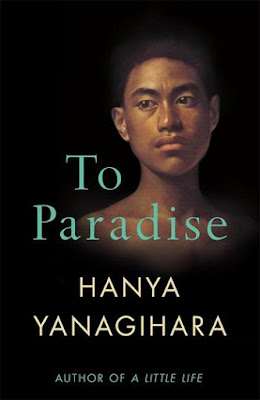Book #05
In an alternate version of 1893 America, New York is part of the Free States, where people may live and love whomever they please (or so it seems). The fragile young scion of a distinguished family resists betrothal to a worthy suitor, drawn to a charming music teacher of no means. In a 1993 Manhattan besieged by the AIDS epidemic, a young Hawaiian man lives with his much older, wealthier partner, hiding his troubled childhood and the fate of his father. And in 2093, in a world riven by plagues and governed by totalitarian rule, a powerful scientist’s damaged granddaughter tries to navigate life without him—and solve the mystery of her husband’s disappearances.
I am not equal to this book, and I would be scratching at the walls of intelligence should I even attempt a proper review. I don’t have the capacity, the steel, or the brain cells to even begin, so here are some vapid thoughts from a woman utterly overwhelmed by, and in love with, Yanagihara’s skill.
Many of us will have gone into this with memories of A Little Life, and the way it wielded its power and grief over our heads; how it plagued and menaced us with unfathomable possibilities; how it made us fall in love only to break our hearts into irreparable shapes, and leave us forever changed. To Paradise, my dear friends, will also do this, but in subtler ways, arguably still as frightening, but with slow creeping realisation, rather than repeated blows from nowhere.
Split into three stories, each a century apart, we explore an alternate reality, in an alternate timeline, and see how the world and society progresses. Although each section could be a standalone story within itself, Yanagihara takes care to link them together with small allusions, character similarities, and recurring locations. Most of all, we see our characters struggling in similar ways - time moves on, yet some things will always remain; loss, loneliness, shame, social struggles, an oppressive government.
And we begin to wonder - in this dystopia which doesn’t feel too far away, who is at fault? What will humanity do to keep themselves safe? Does the government sacrifice people to save others, or are we capable of this as individuals, as a family unit? What makes you a good person? Is it helping your family at the expense of others, or is it making one person miserable and ashamed to benefit the greater good? The messages here are overpowering, they spin you around, confuse you. It’s a wonderful commentary on something impossible to comprehend, and something horribly relevant in all of our lives.
Ultimately, the true wonder here is Yanagihara’s writing. Her paragraphs flow with such beauty, her chosen words seem the perfect fit for each sentence, as though slotted into the most arresting and sorrowful jigsaw puzzle. I found it impossible to tear my eyes away, even with tears stinging the backs of them.
I appreciate this is one which divides opinion, as a book which has garnered so much anticipation is bound to be. For me, it was something sublime, something I devoured over the space of a week without thinking about much else. For others, it could be something which doesn’t meet expectations, but there is no way of matching A Little Life, and I don’t think this was the intent here. Whatever your stance, go in with open minds and hearts, and you just may end up where I was, in a space filled with love and longing, with a full heart and head.

